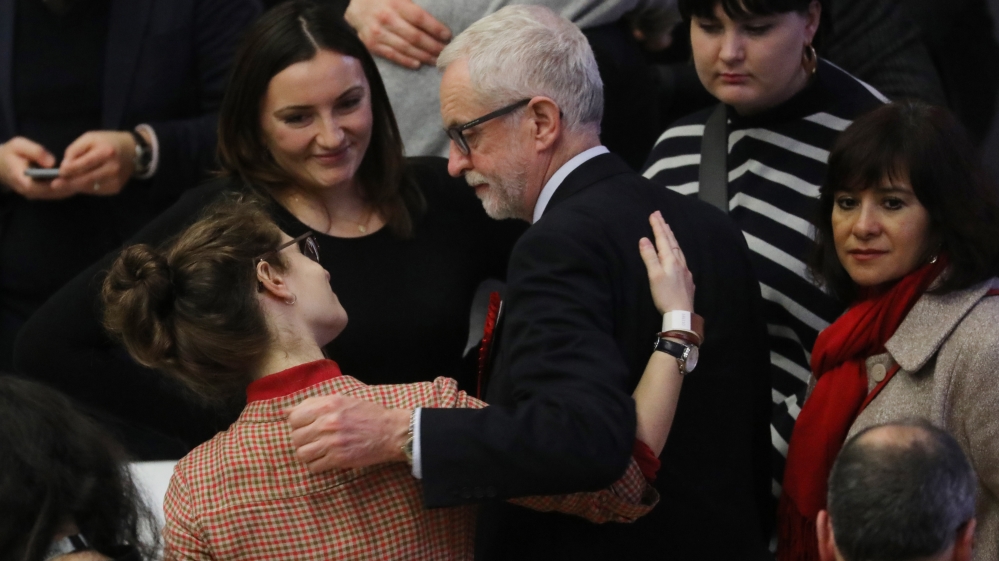
This article is more than
6 year oldAfter his sweeping election win, Prime Minister Boris Johnson said Britain would leave the European Union on January 31
"We will get Brexit done on time by the 31st of January, no ifs, no buts, no maybes," Johnson told cheering supporters on Friday.
"I will make it my mission to work night and day, flat out to prove that you were right in voting for me this time, and to earn your support in the future.
"And I say to you that in this election your voice has been heard, and about time too.
"Because we politicians have squandered the last three years, three and a half years in squabbles - we've even been arguing about arguing, and arguing about the tone of our arguments.
"Leaving the European Union as one United Kingdom, taking back control of our laws, borders, money, our trade, immigration system, delivering on the democratic mandate of the people."
Official results from Thursday's general election, a snap poll called by Johnson to break months of political deadlock over Brexit, showed his Conservatives had won 365 of the 650 seats up for grabs in the House of Commons.
Turnout was about 67 percent, approximately the same level as the previous general election in 2017.
The results marked a decisive shift in British politics. It was the Conservatives' best election performance since 1987 under Margaret Thatcher, and Labour's worst defeat - the party won just 203 seats - since 1935, when Clement Attlee ran the party.
Later on Friday, Johnson left his Downing Street residence to ask Queen Elizabeth for formal permission to create a new government.
He will bring his Brexit deal back to Parliament next week.
If Parliament passes Johnson's existing withdrawal agreement by his January 31 Brexit deadline, it will usher in a potentially gruelling transition period during which the UK and EU are expected to try and hammer out a deal on their future relationship.
Johnson has repeatedly said this period will not be extended past the end of 2020, when it is currently scheduled to end, but there is doubt over whether a comprehensive agreement could be concluded before then.
EU Council President Charles Michel said on Friday the bloc is ready to embark on trade talks with Britain and will do the utmost to protect European priorities after Johnson's win.
"My point is very clear: We are ready. We have decided what are our priorities," said Michel as he arrived at an EU summit where leaders would discuss the aftermath of the UK vote and Britain's planned departure.
"We expect a vote on the withdrawal agreement as soon as possible ... It's important to have clarity as soon as possible."
Several world leaders reacted to Johnson's win.
US President Donald Trump was among the first, writing on Twitter: "Congratulations to Boris Johnson on his great WIN! Britain and the United States will now be free to strike a massive new Trade Deal after BREXIT. This deal has the potential to be far bigger and more lucrative than any deal that could be made with the E.U. Celebrate Boris!"
"Congratulations, Boris Johnson, on your resounding victory. I look forward to working with you for the friendship and strong cooperation between our nations," German Chancellor Angela Merkel said, according to her spokesman.
Russia's Kremlin spokesman Dmitry Peskov told reporters: "Of course we hope every time that political forces that win elections in any country share the ideology of and aim to build good relations with our country. I don't know how appropriate such hopes are in the case of the Conservatives."
Czech Prime Minister Andrej Babis tweeted: "He is a charismatic leader, we share the same kind of thinking. He received strong mandate to deliver Brexit. I'm sorry that Czech Republic loses strong ally in the EU."
Israeli foreign minister, Israel Katz, said Johnson's win was a "victory of values" over anti-Semitism, referring to allegations of anti-Jewish racism in the Labour Party.

Jeremy Corbyn, leader of the main opposition Labour Party, announced he would not be heading another election campaign after Thursday's crushing defeat.
Speaking at a vote count in his north London constituency of Islington, Corbyn, 70, described Labour's performance as "very disappointing" before saying he would lead the party for an interim period while it discussed its future in a "period of reflection".
Several of Labour's so-called "red wall" strongholds across England's Midlands and north - many of which voted in favour of leaving the EU in the UK's 2016 referendum on membership of the bloc - fell to the Conservatives.